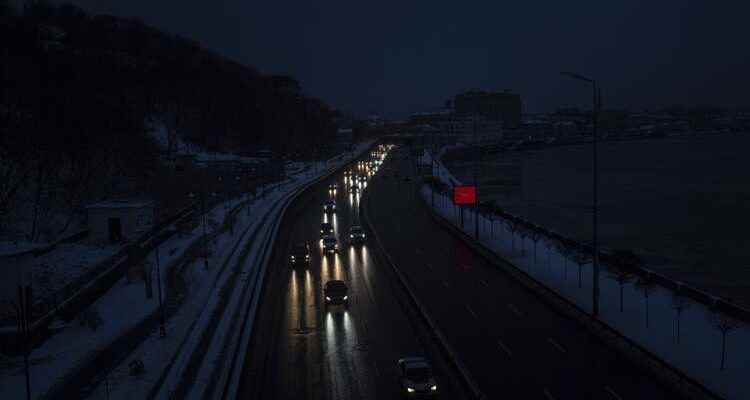Sergei Gerasimov is holding out in Kharkiv. In his war diary, the Ukrainian writer reports on the horrific and absurd everyday life in a city that is still being shelled.
Kyiv highway during the blackout, December 15.
November 23, 2022
Yesterday I watered flowers on the twelfth floor in the empty apartment owned by our friends who moved to Europe months ago. When I was done, I took the elevator to the top floor and stepped out onto the open balcony. It was already night and the city looked dark without its streetlights. However, it wasn’t completely dark, because some of the windows were lit.
I could see three outlines of roofs. The numerous five-story buildings known as Khrushchevki, the cheapest of them all, looked like the undergrowth in a tropical forest. They had the most lighted windows: one or even two out of three.
The rows of nine-story prefabs that lay between them had fewer lighted windows, about one in five. But the tallest buildings were sixteen stories, slender, elegant, and expensive, and they were the darkest. It looks like the percentage of people who were able to cross the border and leave the country was directly proportional to their ability to pay.
I spotted a black wedge in the northern part of Kharkiv where the electricity had probably gone out, but on the whole the city seemed to be in good shape. I couldn’t see the streets because they weren’t lit, but the air was very clear.
Very far away, somewhere in the fields beyond the city limits, some bright lights were moving slowly and I was amazed at how far the eye can see when the night is clear and dark. There was no wind and the silence was perfect. Far below, in the alley at the foot of the building, thin ice cracked under the wheels of the cars and a woman berated her husband for something eminently unimportant.
But that was yesterday and things have changed since then. Now we have a complete power outage. Nobody knows what happened, how and why, because the internet and the mobile phone connection switched off immediately. The Russians probably fired another hundred or more fresh rockets at us.
The only thing you have in abundance during a power outage is time. You can’t do anything useful and suddenly you feel empty. The rooms are getting colder as we don’t have central heating and it’s unlikely to be back on anytime soon. It doesn’t matter where you’re cold, inside or outside, I say to myself and go outside.
The city in the blackout is not black, but has at least fifty-one shades of gray, maybe more, because it is illuminated by the dancing and lying snow. The snowfall has snapped the branches of the trees, making each small twig seem as thick as my wrist. Some children, almost invisible themselves, build invisible snowmen. The taillights of an occasional passing car paint the whole magical forest of snowy trees bright pink. I have an LED lamp with me, but I don’t use it. The snow itself is light enough even when the sky is dark and overcast.
Then I enter the same building I was in yesterday.
The elevator is not working now and I have to climb the stairs to the top floor. The stairwell is frosty and gloomy like an abandoned Siberian mine. I turn on my LED lantern and, with each exhale, I see a cone of swirling vapor catching in the light.
I’m now standing on the top floor balcony looking at the same buildings I saw yesterday. They are not dipped in black. The isolated lights that shine from within do not stand still as before, but sway from left to right or from top to bottom. The buildings resemble deep-sea creatures, partially transparent and glowing with an eerily pale light.
I only see a few cars because the wall of buildings hides them, so I don’t know where the roads go. The whole city lies below and in front of me like a vast field of dead embers. Suddenly I notice glowing streaks in the sky. The next moment I realize what it is: It’s the lights of the cars driving through the darkened streets, reflected off the low-hanging clouds. In front of me is the negative map of the lightless city hanging in the air.
You can even see some streets and avenues in the sky.
To person

Sergei Gerasimov – What is the war?
Of the war diaries written after the February 24 Russian invasion of Ukraine, those of Sergei Vladimirovich Gerasimov are among the most disturbing and touching. They combine the power of observation and knowledge of human nature, empathy and imagination, a sense of the absurd and inquiring intelligence. Gerasimov was born in Kharkiv in 1964. He studied psychology and later wrote a psychology textbook for schools and scientific articles on cognitive activity. His literary ambitions have so far been science fiction and poetry. Gerasimov and his wife live in the center of Kharkiv in an apartment on the third floor of a high-rise building. The NZZ published 71 “Notes from the War” in the spring and 69 in the summer. The first part is now available as a book on DTV under the title «Feuerpanorama». Of course, the author does not run out of material. – Here is the 67th contribution of the third part.
Translated from the English by Andreas Breitenstein.
